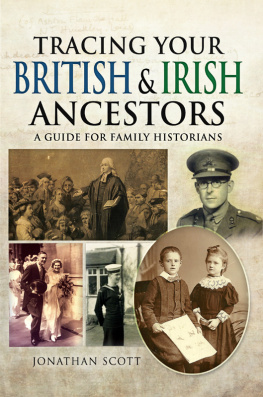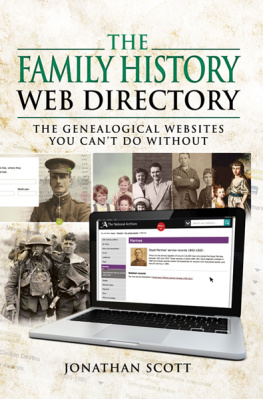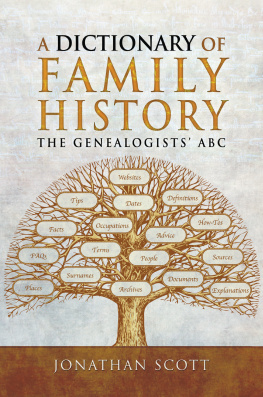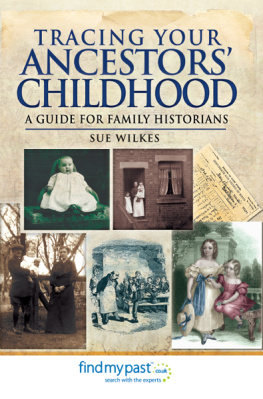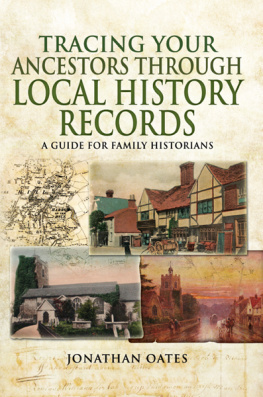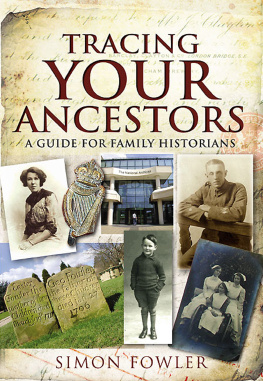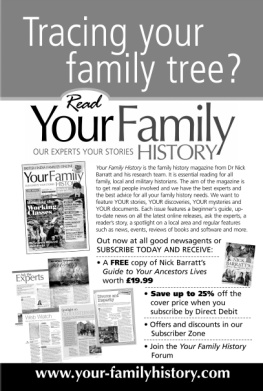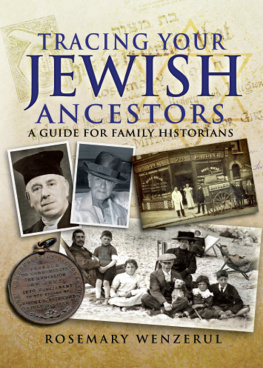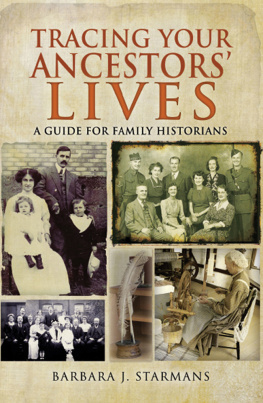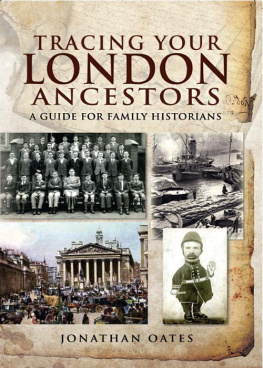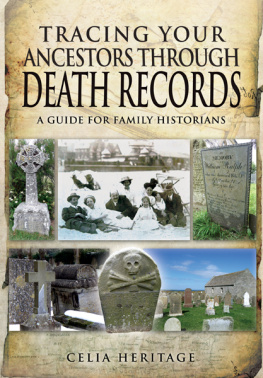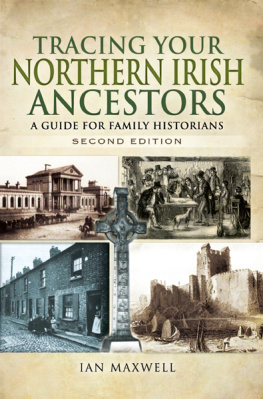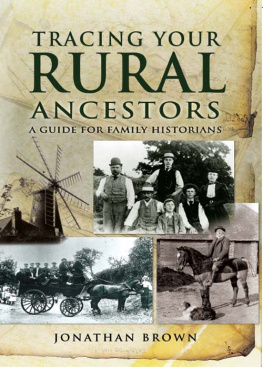
FAMILY HISTORY FROM PEN & SWORD
Tracing Secret Service Ancestors
Tracing Your Air Force Ancestors
Tracing Your Ancestors
Tracing Your Ancestors from 1066 to 1837
Tracing Your Ancestors Through
Death Records
Tracing Your Ancestors Through
Family Photographs
Tracing Your Ancestors Using the Census
Tracing Your Ancestors Childhood
Tracing Your Ancestors Parish Records
Tracing Your Aristocratic Ancestors
Tracing Your Army Ancestors 2nd Edition
Tracing Your Birmingham Ancestors
Tracing Your Black Country Ancestors
Tracing Your British Indian Ancestors
Tracing Your Canal Ancestors
Tracing Your Channel Islands Ancestors
Tracing Your Coalmining Ancestors
Tracing Your Criminal Ancestors
Tracing Your East Anglian Ancestors
Tracing Your East End Ancestors
Tracing Your Edinburgh Ancestors
Tracing Your First World War Ancestors
Tracing Your Great War Ancestors:
The Gallipoli Campaign
Tracing Your Great War Ancestors: The Somme
Tracing Your Great War Ancestors: Ypres
Tracing Your Huguenot Ancestors
Tracing Your Jewish Ancestors
Tracing Your Labour Movement Ancestors
Tracing Your Lancashire Ancestors
Tracing Your Leeds Ancestors
Tracing Your Legal Ancestors
Tracing Your Liverpool Ancestors
Tracing Your London Ancestors
Tracing Your Medical Ancestors
Tracing Your Merchant Navy Ancestors
Tracing Your Naval Ancestors
Tracing Your Northern Ancestors
Tracing Your Pauper Ancestors
Tracing Your Police Ancestors
Tracing Your Prisoner of War Ancestors:
The First World War
Tracing Your Railway Ancestors
Tracing Your Royal Marine Ancestors
Tracing Your Rural Ancestors
Tracing Your Scottish Ancestors
Tracing Your Second World War Ancestors
Tracing Your Servant Ancestors
Tracing Your Service Women Ancestors
Tracing Your Shipbuilding Ancestors
Tracing Your Tank Ancestors
Tracing Your Textile Ancestors
Tracing Your Trade and Craftsmen Ancestors
Tracing Your Welsh Ancestors
Tracing Your West Country Ancestors
Tracing Your Yorkshire Ancestors
First published in Great Britain in 2016
PEN & SWORD FAMI LY HI STORY
an imprint of
Pen & Sword Books Ltd
47 Church Street ,
Barnsley
South Yorkshire ,
S70 2AS
Copyright Jonathan Scott , 2016
ISBN 978 147385 325 6
The right of Jonathan Scott to be identified as Author of the Work has been asserted by him in accordance with the Copyright , Designs and Patents Act 1988.
A CIP catalogue record for this book is available from the British Library.
All rights reserved. No part of this book may be reproduced or transmitted in any form or by any means , electronic or mechanical including photocopying , recording or by any information storage and retrieval system , without permission from the Publisher in writing.
Typeset in Palatino by CHIC GRAPHICS
Printed and bound in England by
CPI Group (UK) , Croydon , CR0 4YY
Pen & Sword Books Ltd incorporates the imprints of Pen & Sword Archaeology , Atlas , Aviation , Battleground , Discovery , Family History , History , Maritime , Military , Naval , Politics , Railways , Select , Social History , Transport , True Crime , Claymore Press , Frontline Books , Leo Cooper , Praetorian Press , Remember When , Seaforth Publishing and Wharncliffe.
For a complete list of Pen & Sword titles please contact
PEN & SWORD BOOKS LTD
47 Church Street , Barnsley , South Yorkshire , S70 2AS , England
E-mail:
Website: www.pen-and-sword.co.uk
CONTENTS
But itll leave us practically penniless!
For Genevieve
Chapter 1
BEGINNINGS
WHAT YOU KNOW
Imagine this: youve just woken up and found yourself alone, on top of a hill. You stand up. You have no idea where you are or how you got there. Lets throw in some fog. There, its foggy. You need to get home, but to do that you need to figure out where you are. What do you do first? You look around.
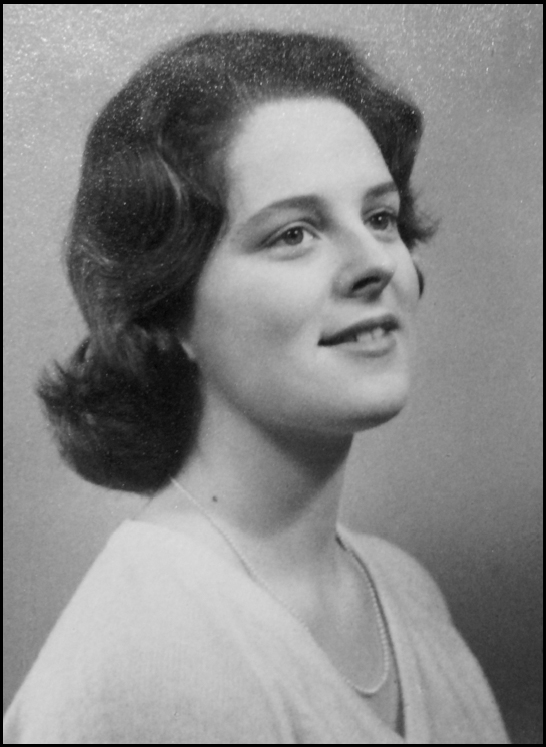
Pennie, Penrose, Kate, Warren. Just some of the names my mother goes by.
Family history, to begin with, is much the same. You start by taking a look around. You need to check the ground beneath your feet, to check what youre standing on is firm. You need to remove any assumptions, you need to try and forget everything you think you know and concentrate on facts. And very slowly, like a person with arms outstretched feeling their way through a foggy landscape, you move from the known into the unknown, checking your footing with every step.
Take your mothers first name. Most of you will assume you know your mothers first name. But do you actually know it? Do you have her name recorded on a birth certificate nestled away in your family archive? Can you lay your hands on irreversible proof that the name you have just jotted down is the same as the name that the state holds?
If you had met me just fifteen years ago and asked me my mothers first name, the answer I would have given you would have been wrong. Indeed, the answer she would give you today would not be the same as the answer the state would give. I was in my twenties by the time I finally picked up a letter and asked: Why does your bank always call you Kate? I was expecting a tale of misunderstanding never put right, but it turned out her name is Kate. It was the name she was born with, baptised with and registered with, just not the name she ever went by. And this is more common than you might think. People often dont go by the names they were given. I went to school with a boy who veered between calling himself Simon (his middle name) and Piers (his first name).
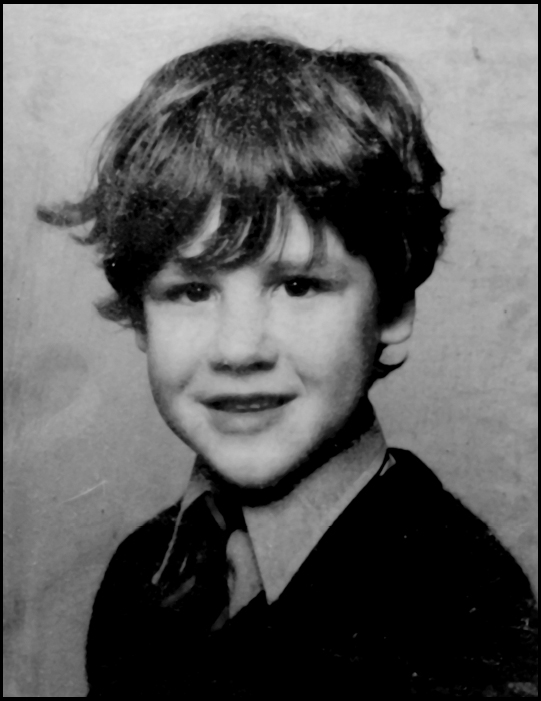
I can trace my family back to 1066 dont you know! The author as irritating youth.
When you enter the first antechamber of genealogical research you not only need be aware of what you dont yet know, but also what you think you already know . It may sound unimportant, but checking birth, marriage and death indexes is the first chore for many a researcher, and its amazing just how many family historians are almost immediately thwarted often because of erroneous assumptions and family myths. As an irritating, corduroyed youth, I would boast to anyone who would listen that I could trace my family back to 1066. In the words of my former editor Simon Fowler, that turned out to be rubbish. (He actually used a different word.)
Now, this book is aimed at researchers from all over the world tracing British and Irish roots, the emphasis being toward readers who cant easily travel here to conduct research first hand. Thats not to say I will ignore physical sources that have to be checked in person far from it but the focus will predominantly be on sources, services, finding aids and advice that can be found online.
Getting Started
Go to wherever you keep your old stuff and take it out. If you dont have any kind of family archive, dont worry, just skip to the next chapter. But if you do, dive in, lay it all over a carpeted floor while a radio plays something you like, and organise it into categories. Your categories could be Immediate Family (if you find the short-form birth certificate of your mother, put this here), Wider Family (a named photograph of a great uncle in his service uniform would be put here), Unknown (for any unnamed photographs/items) and Miscellaneous (for random ephemera such as ancient bills or uniform buttons).
Next page
